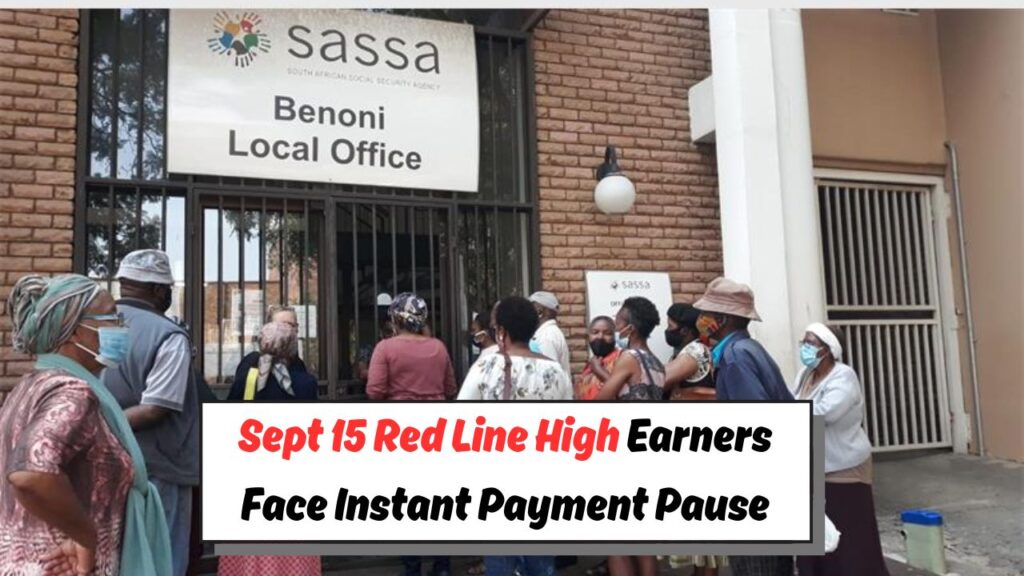SASSA Shocker: Payments Over R8,070 Cease After September 15 for High Earners: The recent announcement by the South African Social Security Agency (SASSA) has taken many by surprise, especially those who have been receiving payments exceeding R8,070. As of September 15, these disbursements will discontinue for individuals considered high earners. This decision is part of a broader strategy to ensure that social assistance is more equitably distributed among those who need it most. In a country where income inequality remains a significant issue, this move aims to redirect resources to low-income individuals and families, thereby promoting greater economic balance. While this change is meant to enhance fairness, it also poses challenges for those who have depended on these payments as a financial cushion. The implications of this decision are vast, affecting not only the recipients but also the broader South African economy.

Understanding the SASSA High Earner Cut-Off
The decision to cease payments over R8,070 after September 15 has raised several questions about what constitutes a high earner in the context of SASSA’s framework. The cut-off is based on a comprehensive assessment of income levels and the financial landscape in South Africa. SASSA defines ‘high earners’ as those whose income levels are above a certain threshold, making them less reliant on state assistance for their day-to-day needs. This threshold is determined by considering various factors, including the cost of living, inflation rates, and average household incomes. The goal is to ensure that social grants are allocated to those who truly need them, such as the unemployed, elderly, or individuals with disabilities. By doing so, SASSA hopes to alleviate poverty and reduce inequalities in society. However, this approach has not been without controversy, as critics argue that the income cut-off may not adequately reflect the financial realities faced by many South Africans, particularly those living in urban areas where the cost of living is significantly higher.
Impact on South African Households and Economy
The cessation of payments over R8,070 will have a ripple effect on numerous South African households. For many, these payments have been a crucial component of their monthly budget, helping to cover essential expenses such as food, utilities, and healthcare. The sudden halt of this financial support will likely strain household finances, forcing many to re-evaluate their spending and seek alternative sources of income. Additionally, the broader economic impact cannot be overlooked. Social grants play a vital role in stimulating local economies, particularly in rural areas where economic opportunities are limited. The withdrawal of these funds could lead to decreased consumer spending, affecting small businesses and local markets that rely heavily on the purchasing power of grant recipients. While the intention behind this policy change is to direct funds to those in greater need, the immediate effects may include increased financial pressure on families and potential rises in poverty levels, at least in the short term.
Alternative Support Measures for Affected Individuals
In response to concerns about the impact of ceasing payments over R8,070, the South African government and SASSA have emphasized the availability of alternative support measures for affected individuals. These include various social assistance programs designed to cater to different needs, such as food parcels, educational grants, and healthcare subsidies. Additionally, SASSA is working to improve access to employment opportunities and skills development programs that aim to empower individuals to become self-sufficient. The government is also encouraging affected individuals to seek financial counseling services to help them manage their finances more effectively during this transition. While these measures are steps in the right direction, the effectiveness of these programs largely depends on their accessibility and the extent to which they can adequately replace the lost income. Continuous monitoring and adjustment of these programs will be crucial to ensure they address the needs of the affected population effectively.
The Future of Social Grants in South Africa
As SASSA implements the cessation of payments over R8,070, the future of social grants in South Africa hangs in a delicate balance. Policymakers are tasked with the challenge of creating a sustainable social assistance framework that both supports those in need and adapts to the evolving economic landscape. This move reflects a broader trend towards targeted assistance, where resources are focused on individuals and families most in need, rather than a blanket approach. Going forward, SASSA will likely continue to refine its criteria for grant eligibility, potentially introducing more nuanced measures that take into account regional disparities and cost-of-living differences. Additionally, there is ongoing debate about the potential introduction of a universal basic income as a long-term solution to poverty and inequality. While the cessation of high-earning payments is a bold step, it is clear that more comprehensive strategies are required to address the underlying socio-economic challenges facing South Africa.




